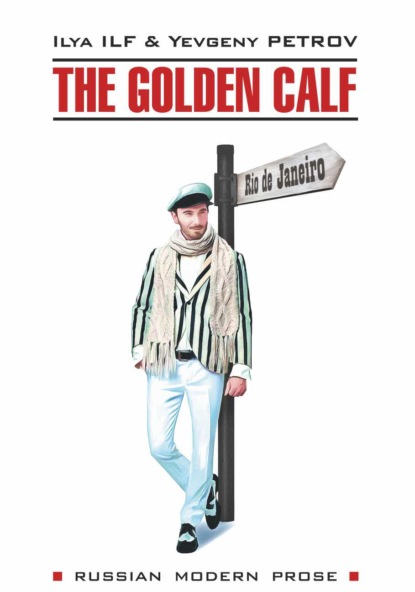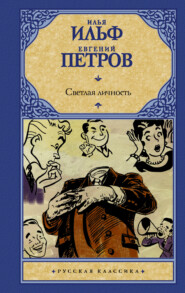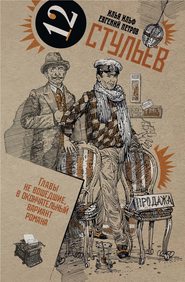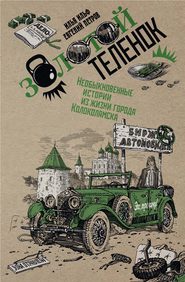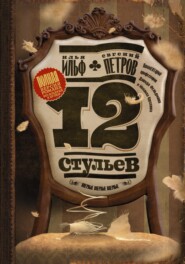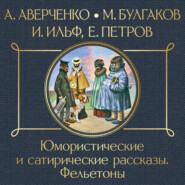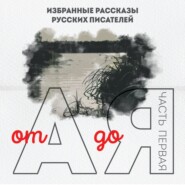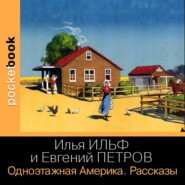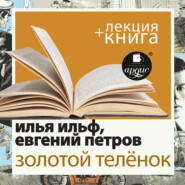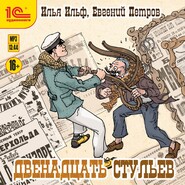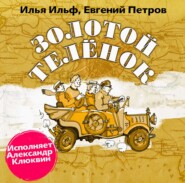По всем вопросам обращайтесь на: info@litportal.ru
(©) 2003-2024.
✖
Золотой теленок / The Golden Calf
Автор
Жанр
Серия
Год написания книги
1931
Теги
Настройки чтения
Размер шрифта
Высота строк
Поля
“Well, I won’t torture you any more. The chairman showered me with gold – eight rubles. But keep in mind, dearest Shura, that I have no intention of nourishing you for free. For every vitamin I feed you, I will demand numerous small favors in return.”
But since there was no private sector in town, the brothers ended up eating at a cooperative summer garden, where special posters informed the customers of Arbatov’s newest contribution to public dining:
“We’ll settle for kvass,” said Balaganov.
“Especially considering that the local kvass is produced by a group of private artisans who are friendly with the Soviet regime,” added Ostap. “Now tell me what exactly this devil Panikovsky did wrong. I love stories of petty thievery.”
Satiated, Balaganov looked at his rescuer with gratitude and began the story. It took a good two hours to tell and was full of exceptionally interesting details.
In all fields of human endeavor, the supply and demand of labor is regulated by specialized bodies.
A theater actor will move to the city of Omsk only if he knows for sure that he need not worry about competition – namely, that there are no other candidates for his recurring role as the indifferent lover or the servant who announces that dinner is ready. Railroad employees are taken care of by their own unions, who helpfully put notices in the papers to the effect that unemployed baggage handlers cannot count on getting work on the Syzran-Vyazma Line or that the Central Asian Line is seeking four crossing guards. A commodities expert places an ad in the paper, and then the entire country learns that there is a commodities expert with ten years’ experience who wishes to move from Moscow to the provinces for family reasons.
Everything is regulated, everything flows along clear channels and comes full circle in compliance with the law and under its protection.
And only one particular market was in a state of chaos – that of con artists claiming to be the children of Lieutenant Schmidt. Anarchy ravaged the ranks of the Lieutenant’s offspring.
Their trade was not producing all the potential gains that should have been virtually assured by brief encounters with government officials, municipal administrators, and community activists – for the most part an extremely gullible bunch.
Fake grandchildren of Karl Marx, non-existent nephews of Friedrich Engels, brothers of the Education Commissar Lunacharsky, cousins of the revolutionary Klara Zetkin, or, in the worst case, the descendants of that famous anarchist, Prince Kropotkin, had been extorting and begging all across the country.
From Minsk to the Bering Strait and from the Turkish border to the Arctic shores, relatives of famous persons enter local councils, get off trains, and anxiously ride in cabs. They are in a hurry. They have a lot to do.
At some point, however, the supply of relatives exceeded the demand, and this peculiar market was hit by a recession. Reform was needed. Little by little, order was established among the grandchildren of Karl Marx, the Kropotkins, the Engelses, and others. The only exception was the unruly guild of Lieutenant Schmidt’s children, which, like the Polish parliament, was always torn by anarchy. For some reason, the children were all difficult, rude, greedy, and kept spoiling the fruits of each other’s labors.
Shura Balaganov, who considered himself the Lieutenant’s firstborn, grew very concerned about market conditions. More and more often he was bumping into fellow guild members who had completely ruined the bountiful fields of Ukraine and the vacation peaks of the Caucasus, places that used to be quite lucrative for him.
“And you couldn’t handle the growing difficulties?” asked Ostap teasingly.
But Balaganov didn’t notice the irony. Sipping the purple kvass, he went on with his story.
The only solution to this tense situation was to hold a conference. Balaganov spent the whole winter organizing it. He wrote to the competitors he knew personally. Those he didn’t know received invitations through the grandsons of Karl Marx whom he bumped into on occasion. And finally, in the early spring of 1928, nearly all the known children of Lieutenant Schmidt assembled in a tavern in Moscow, near the Sukharev Tower. The gathering was impressive. Lieutenant Schmidt, as it turned out, had thirty sons, who ranged in age between eighteen and fifty-two, and four daughters, none of them smart, young, or pretty.
In a brief keynote address, Balaganov expressed hope that the brothers would at last come to an understanding and conclude a pact, the necessity of which was dictated by life itself.
According to Balaganov’s plan, the entire Soviet Union was to be divided into thirty-four operational areas, one for everyone present. Each child would be assigned a territory on a long-term basis. All guild members would be prohibited from crossing the boundaries and trespassing into someone else’s territory for the purpose of earning a living.
Nobody objected to the new work rules except Panikovsky, who declared early on that he would do perfectly well without any pacts. The division of the country was accompanied by some very ugly scenes, however. All parties to the treaty immediately started fighting and began addressing one another exclusively with rude epithets.
The bone of contention was the assignment of the territories. Nobody wanted large cities with universities. Nobody cared for Moscow, Leningrad, and Kharkov – these cities had seen it all. To a person, they refused the Republic of the Volga Germans.
“Why, is that such a bad republic?” asked Balaganov innocently. “I think it’s a good place. As civilized people, the Germans cannot refuse to help out.”
“Oh, come on!” yelled the agitated children. “Try to get anything out of those Germans!”
Apparently, quite a few of them had been thrown into jail by distrustful German colonists. The distant Central Asian regions, buried in the desert sand, had a very bad reputation as well. They were accused of being unfamiliar with the person of Lieutenant Schmidt.
“You think I’m stupid!” shrieked Panikovsky. “Give me Central Russia, then I’ll sign the pact.”
“What? The entire Center?” mocked Balaganov. “Would you also like Melitopol on top of that? Or Bobruisk?”
At the word Bobruisk, the children moaned painfully. Everyone was prepared to go to Bobruisk immediately. Bobruisk was considered a wonderful, highly civilized place.
“Fine, not the whole Center,” the greedy Panikovsky kept insisting, “give me half. After all, I am a family man, I have two families.”
But he didn’t get even half.
After much commotion, it was decided to assign the areas by drawing lots. Thirty-four slips of paper were cut up, and each had a geographical name written on it. Lucrative Kursk and questionable Kherson, barely touched Minusinsk and nearly hopeless Ashkhabad, Kiev, Petrozavodsk, Chita – all the republics and regions lay in somebody’s rabbit-fur hat waiting for their masters.
The drawing was accompanied by cheers, suppressed moans, and swearing.
Panikovsky’s unlucky star played a role in the outcome. He ended up with the barren republic of the vindictive Volga Germans. He joined the pact, but he was mad as hell.
“I’ll go,” he yelled, “but I’m warning you: if they don’t treat me well, I’ll violate the pact, I’ll trespass!”
Balaganov, who drew the golden Arbatov territory, became alarmed. He declared then and there that he would not tolerate any violations of the operational guidelines.
Either way, order was established, and the thirty sons and four daughters of Lieutenant Schmidt headed for their areas of operation.
“And now, Bender, you just saw for yourself how that bastard broke the pact,” said Shura Balaganov, concluding the story. “He’s been creeping around my territory for a while, I just couldn’t catch him.”
Against Shura’s expectations, Ostap did not condemn Panikovsky’s infraction. Bender was leaning back in his chair and staring absentmindedly into the distance. The back wall of the restaurant garden was high and painted with pictures of trees, symmetrical and full of leaves, like in a school reader. There were no real trees in the garden, but the shade of the wall provided a refreshing coolness which satisfied the customers. Apparently, they were all union members, since they were drinking nothing but beer – without any snacks.
A bright green car drove up to the gate of the garden, gasping and backfiring incessantly. There was a white semi-circular sign on its door which read LET’S RIDE! Below the sign were the rates for trips in this cheerful vehicle. Three rubles per hour. One-way fares by arrangement. There were no passengers in the car.
The customers started nervously whispering to each other. For about five minutes, the driver stared pleadingly through the latticed fence of the garden. Apparently losing hope of getting any passengers, he dared them:
“The taxi is free! Please get in!”
But nobody showed any desire to get into the LET’S RIDE! car. Even the invitation itself had the most peculiar effect on people. They hung their heads and tried not to look towards the car. The driver shook his head and slowly drove off. The citizens of Arbatov followed him glumly with their eyes. Five minutes later, the green vehicle whizzed by in the opposite direction at top speed. The driver was bouncing up and down in his seat and shouting something unintelligible. There were still no passengers.
Ostap followed it with his eyes and said:
“Well, let me tell you, Balaganov, you are a loser. Don’t be offended. I’m just trying to point out your exact position in the grand scheme of things.”
“Go to hell!” said Balaganov rudely.
“So you took offense anyway? Do you really think that being the Lieutenant’s son doesn’t make you a loser?”
“But you are a son of Lieutenant Schmidt yourself!” exclaimed Balaganov.
“You are a loser,” repeated Ostap. “Son of a loser. Your children will be losers, too. Look, kiddo. What happened this morning was not even a phase, it was nothing, a pure accident, an artist’s whim. A gentleman in search of pocket money. It’s not in my nature to fish for such a miserable rate of return. And what kind of a trade is that, for God’s sake! Son of Lieutenant Schmidt! Well, maybe another year, maybe two. And then what? Your red locks will grow familiar, and they’ll simply start beating you up.”
“So what am I supposed to do?” asked Balaganov, alarmed. “How am I supposed to win my daily bread?”
“You have to think,” said Ostap sternly. “I, for one, live off ideas. I don’t beg for a lousy ruble from the city hall. My horizons are broader. I see that you love money selflessly. Tell me, what amount appeals to you?”
“Five thousand,” answered Balaganov quickly.
But since there was no private sector in town, the brothers ended up eating at a cooperative summer garden, where special posters informed the customers of Arbatov’s newest contribution to public dining:
“We’ll settle for kvass,” said Balaganov.
“Especially considering that the local kvass is produced by a group of private artisans who are friendly with the Soviet regime,” added Ostap. “Now tell me what exactly this devil Panikovsky did wrong. I love stories of petty thievery.”
Satiated, Balaganov looked at his rescuer with gratitude and began the story. It took a good two hours to tell and was full of exceptionally interesting details.
In all fields of human endeavor, the supply and demand of labor is regulated by specialized bodies.
A theater actor will move to the city of Omsk only if he knows for sure that he need not worry about competition – namely, that there are no other candidates for his recurring role as the indifferent lover or the servant who announces that dinner is ready. Railroad employees are taken care of by their own unions, who helpfully put notices in the papers to the effect that unemployed baggage handlers cannot count on getting work on the Syzran-Vyazma Line or that the Central Asian Line is seeking four crossing guards. A commodities expert places an ad in the paper, and then the entire country learns that there is a commodities expert with ten years’ experience who wishes to move from Moscow to the provinces for family reasons.
Everything is regulated, everything flows along clear channels and comes full circle in compliance with the law and under its protection.
And only one particular market was in a state of chaos – that of con artists claiming to be the children of Lieutenant Schmidt. Anarchy ravaged the ranks of the Lieutenant’s offspring.
Their trade was not producing all the potential gains that should have been virtually assured by brief encounters with government officials, municipal administrators, and community activists – for the most part an extremely gullible bunch.
Fake grandchildren of Karl Marx, non-existent nephews of Friedrich Engels, brothers of the Education Commissar Lunacharsky, cousins of the revolutionary Klara Zetkin, or, in the worst case, the descendants of that famous anarchist, Prince Kropotkin, had been extorting and begging all across the country.
From Minsk to the Bering Strait and from the Turkish border to the Arctic shores, relatives of famous persons enter local councils, get off trains, and anxiously ride in cabs. They are in a hurry. They have a lot to do.
At some point, however, the supply of relatives exceeded the demand, and this peculiar market was hit by a recession. Reform was needed. Little by little, order was established among the grandchildren of Karl Marx, the Kropotkins, the Engelses, and others. The only exception was the unruly guild of Lieutenant Schmidt’s children, which, like the Polish parliament, was always torn by anarchy. For some reason, the children were all difficult, rude, greedy, and kept spoiling the fruits of each other’s labors.
Shura Balaganov, who considered himself the Lieutenant’s firstborn, grew very concerned about market conditions. More and more often he was bumping into fellow guild members who had completely ruined the bountiful fields of Ukraine and the vacation peaks of the Caucasus, places that used to be quite lucrative for him.
“And you couldn’t handle the growing difficulties?” asked Ostap teasingly.
But Balaganov didn’t notice the irony. Sipping the purple kvass, he went on with his story.
The only solution to this tense situation was to hold a conference. Balaganov spent the whole winter organizing it. He wrote to the competitors he knew personally. Those he didn’t know received invitations through the grandsons of Karl Marx whom he bumped into on occasion. And finally, in the early spring of 1928, nearly all the known children of Lieutenant Schmidt assembled in a tavern in Moscow, near the Sukharev Tower. The gathering was impressive. Lieutenant Schmidt, as it turned out, had thirty sons, who ranged in age between eighteen and fifty-two, and four daughters, none of them smart, young, or pretty.
In a brief keynote address, Balaganov expressed hope that the brothers would at last come to an understanding and conclude a pact, the necessity of which was dictated by life itself.
According to Balaganov’s plan, the entire Soviet Union was to be divided into thirty-four operational areas, one for everyone present. Each child would be assigned a territory on a long-term basis. All guild members would be prohibited from crossing the boundaries and trespassing into someone else’s territory for the purpose of earning a living.
Nobody objected to the new work rules except Panikovsky, who declared early on that he would do perfectly well without any pacts. The division of the country was accompanied by some very ugly scenes, however. All parties to the treaty immediately started fighting and began addressing one another exclusively with rude epithets.
The bone of contention was the assignment of the territories. Nobody wanted large cities with universities. Nobody cared for Moscow, Leningrad, and Kharkov – these cities had seen it all. To a person, they refused the Republic of the Volga Germans.
“Why, is that such a bad republic?” asked Balaganov innocently. “I think it’s a good place. As civilized people, the Germans cannot refuse to help out.”
“Oh, come on!” yelled the agitated children. “Try to get anything out of those Germans!”
Apparently, quite a few of them had been thrown into jail by distrustful German colonists. The distant Central Asian regions, buried in the desert sand, had a very bad reputation as well. They were accused of being unfamiliar with the person of Lieutenant Schmidt.
“You think I’m stupid!” shrieked Panikovsky. “Give me Central Russia, then I’ll sign the pact.”
“What? The entire Center?” mocked Balaganov. “Would you also like Melitopol on top of that? Or Bobruisk?”
At the word Bobruisk, the children moaned painfully. Everyone was prepared to go to Bobruisk immediately. Bobruisk was considered a wonderful, highly civilized place.
“Fine, not the whole Center,” the greedy Panikovsky kept insisting, “give me half. After all, I am a family man, I have two families.”
But he didn’t get even half.
After much commotion, it was decided to assign the areas by drawing lots. Thirty-four slips of paper were cut up, and each had a geographical name written on it. Lucrative Kursk and questionable Kherson, barely touched Minusinsk and nearly hopeless Ashkhabad, Kiev, Petrozavodsk, Chita – all the republics and regions lay in somebody’s rabbit-fur hat waiting for their masters.
The drawing was accompanied by cheers, suppressed moans, and swearing.
Panikovsky’s unlucky star played a role in the outcome. He ended up with the barren republic of the vindictive Volga Germans. He joined the pact, but he was mad as hell.
“I’ll go,” he yelled, “but I’m warning you: if they don’t treat me well, I’ll violate the pact, I’ll trespass!”
Balaganov, who drew the golden Arbatov territory, became alarmed. He declared then and there that he would not tolerate any violations of the operational guidelines.
Either way, order was established, and the thirty sons and four daughters of Lieutenant Schmidt headed for their areas of operation.
“And now, Bender, you just saw for yourself how that bastard broke the pact,” said Shura Balaganov, concluding the story. “He’s been creeping around my territory for a while, I just couldn’t catch him.”
Against Shura’s expectations, Ostap did not condemn Panikovsky’s infraction. Bender was leaning back in his chair and staring absentmindedly into the distance. The back wall of the restaurant garden was high and painted with pictures of trees, symmetrical and full of leaves, like in a school reader. There were no real trees in the garden, but the shade of the wall provided a refreshing coolness which satisfied the customers. Apparently, they were all union members, since they were drinking nothing but beer – without any snacks.
A bright green car drove up to the gate of the garden, gasping and backfiring incessantly. There was a white semi-circular sign on its door which read LET’S RIDE! Below the sign were the rates for trips in this cheerful vehicle. Three rubles per hour. One-way fares by arrangement. There were no passengers in the car.
The customers started nervously whispering to each other. For about five minutes, the driver stared pleadingly through the latticed fence of the garden. Apparently losing hope of getting any passengers, he dared them:
“The taxi is free! Please get in!”
But nobody showed any desire to get into the LET’S RIDE! car. Even the invitation itself had the most peculiar effect on people. They hung their heads and tried not to look towards the car. The driver shook his head and slowly drove off. The citizens of Arbatov followed him glumly with their eyes. Five minutes later, the green vehicle whizzed by in the opposite direction at top speed. The driver was bouncing up and down in his seat and shouting something unintelligible. There were still no passengers.
Ostap followed it with his eyes and said:
“Well, let me tell you, Balaganov, you are a loser. Don’t be offended. I’m just trying to point out your exact position in the grand scheme of things.”
“Go to hell!” said Balaganov rudely.
“So you took offense anyway? Do you really think that being the Lieutenant’s son doesn’t make you a loser?”
“But you are a son of Lieutenant Schmidt yourself!” exclaimed Balaganov.
“You are a loser,” repeated Ostap. “Son of a loser. Your children will be losers, too. Look, kiddo. What happened this morning was not even a phase, it was nothing, a pure accident, an artist’s whim. A gentleman in search of pocket money. It’s not in my nature to fish for such a miserable rate of return. And what kind of a trade is that, for God’s sake! Son of Lieutenant Schmidt! Well, maybe another year, maybe two. And then what? Your red locks will grow familiar, and they’ll simply start beating you up.”
“So what am I supposed to do?” asked Balaganov, alarmed. “How am I supposed to win my daily bread?”
“You have to think,” said Ostap sternly. “I, for one, live off ideas. I don’t beg for a lousy ruble from the city hall. My horizons are broader. I see that you love money selflessly. Tell me, what amount appeals to you?”
“Five thousand,” answered Balaganov quickly.





